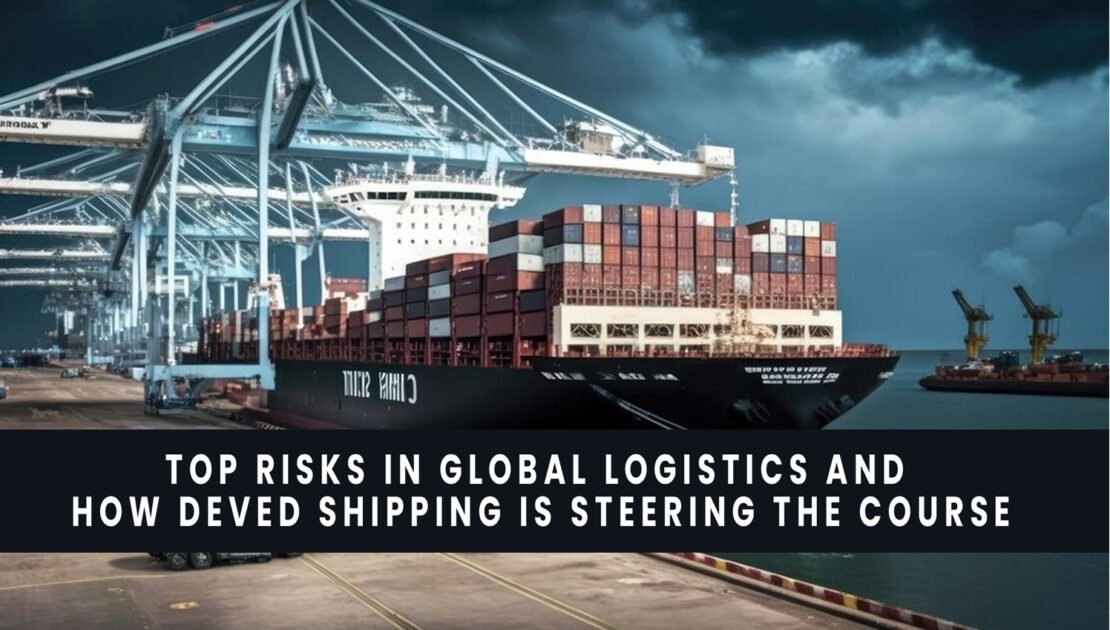Top Risks in Global Logistics and How Deved Shipping is Steering the Course

The global logistics landscape is a complex web of interconnected pathways, constantly evolving and adapting to the ever-changing tides of the world.
While this dynamism presents immense opportunities, it also carries inherent risks that businesses must navigate with prudence.
Here, we delve into some of the most prominent challenges plaguing the industry and explore how DEVED Shipping, a leading Dubai-based logistics company, is contributing to a more resilient and sustainable future.
Economic and Geopolitical Crossroads:
Global economic slowdown:
A sluggish global economy can lead to decreased demand for goods, impacting transportation and logistics businesses.
DEVED Shipping actively mitigates this risk by diversifying its clientele and expanding its service offerings to cater to a wider range of industries, fostering resilience in the face of economic fluctuations.
Geopolitical instability:
Trade wars, political tensions, and regional conflicts can disrupt supply chains, causing delays and increasing costs.
DEVED Shipping addresses this challenge by establishing strategic partnerships with international stakeholders, ensuring smooth operation across borders and fostering a collaborative approach to navigating geopolitical complexities.
Rising inflation:
Inflationary pressures can make it expensive to source materials, transport goods, and operate logistics facilities.
DEVED Shipping combats this issue by implementing cost-optimization strategies, leveraging technological advancements to streamline operations, and fostering transparency with its clients to navigate the inflationary landscape collaboratively.
Environmental and Operational Currents:
Climate change:
Extreme weather events like floods, storms, and droughts can disrupt transportation infrastructure and damage logistics facilities.
DEVED Shipping actively tackles this challenge by adopting sustainable practices throughout its operations, including utilizing eco-friendly fuel alternatives and investing in renewable energy sources to minimize its environmental footprint.
Natural disasters:
Earthquakes, tsunamis, and other natural disasters can cause widespread disruptions and infrastructure damage, impacting logistics operations.
DEVED Shipping addresses this risk by implementing robust contingency plans, investing in disaster preparedness training for its personnel, and establishing partnerships with local emergency response teams to ensure swift and effective response in the event of unforeseen circumstances.
Cybersecurity threats:
Cyberattacks on transportation and logistics companies can disrupt operations, cause data breaches, and lead to financial losses.
DEVED Shipping prioritizes cybersecurity by implementing robust defense mechanisms, regularly updating its software and systems, and educating its employees on best practices for cyber hygiene.
Navigating the Human Factor:
Labor shortages:
A shortage of skilled workers in the transportation and logistics industry can impact operations and lead to delays.
DEVED Shipping addresses this challenge by investing in its workforce through comprehensive training programs, fostering a culture of continuous learning and development, and offering competitive compensation packages to attract and retain top talent.
Charting a Course Through Uncertainty:
Supply chain disruptions:
Shortages of raw materials, components, or finished goods due to various factors can disrupt production and delivery schedules.
DEVED Shipping mitigates this risk by maintaining close relationships with its suppliers, implementing robust inventory management practices, and exploring alternative sourcing options to ensure supply chain continuity.
Compliance challenges:
The increasing complexity of regulations, including those related to environmental sustainability and data privacy, can pose challenges for logistics companies.
DEVED Shipping prioritizes compliance by establishing a dedicated team of experts to stay abreast of evolving regulations, implementing comprehensive compliance frameworks, and fostering a culture of ethical and responsible business practices.
In conclusion, the global logistics landscape is a dynamic and ever-evolving ecosystem fraught with challenges.
By acknowledging and strategically addressing these risks, DEVED Shipping is not only ensuring its own success but also contributing to a more resilient, sustainable, and efficient future for the entire industry.
